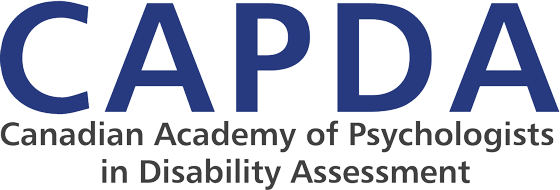Disability Assessments: Expanding our definition and understanding of disability evaluations, both in terms of scope and application.
March 3, 2021, 7:30 - 8:30 PM
The CAPDA Board of Directors is pleased to offer a series of monthly Zoom sessions titled "Truth Through Discourse", which offers open discussion on various topics of interest to psychologists, psychological associates and clinical psychology graduate students.
Scheduled from 7:30 - 8:30 pm on the first Wednesday of each month, these discussions are offered free for CAPDA members and $5 for non-members for each session.
Our next session is scheduled for Wednesday March 3 to discuss Disability Assessments: Expanding our definition and understanding of disability evaluations, both in terms of scope and application.
The discussion will be moderated by Dr. Annette Lorenz ED D, C. PSYCH
Since I began my membership with CAPDA, pretty well most, if not all, continuing education events and presentations focused on disability evaluations related to motor vehicle accidents, personal injury, and medical legal applications of these. For some time, I have wanted to expand our conversations about the meaning and application of disability assessments to other areas of psychological practice and would like to invite my colleagues across Canada to join us in expanding both our discourse and bring in presenters and workshops that may encourage colleagues from other areas of practice to join us for our events and hopefully, also as members.
I would therefore like to offer some discussion points which I hope will start our conversations.
Practice areas where disability plays a role are much more diverse than we are currently covering in our events: Criminality, physical health, treatment planning, custody/access, cognitive and learning (School Psychology) correctional rehabilitation planning….and the list continues.
- Definitions of disability can be expressed and described in several ways. For example, definitions of disability might also be described as the patterns, and the consistency of those patterns, in meeting or not meeting daily demands of work and/or personal life.
- Disability may well be assessed on a continuum rather than based on a threshold.
- Definitions of disability are not based on the same principles in all areas of psychological practice and not the same in all areas of work or environment, nor are they the same for all individuals and expectations.
- What about personality? Are personality features contributing factors in the definition of disability? What about patterns of criminality? Is psychopathy a disability? Is criminality a disability? Is criminal behavior a disability or is it a personality aberration? Is Autism a disability?
- What about the objective of our disability evaluations: When we do evaluations, we often assess with the purpose in mind that compensation might be sought by the individual who is being assessed, or, a third-party has this in mind. How will this influence our evaluation?
- If an individual has a learning disability or impairment in their functioning BUT is able to compensate to a significant enough degree such that they are able to function quite well, are they still disabled? Are they impaired? Or are they just “different”? What about cultural perspective? Quality of life? Does quality of life figure into the evaluation of disability?
- By whose standards do we assess disability? Does this not depend on the area of practice being exercised by the expert who assesses this?
I would like to invite my colleagues from all areas of psychological practice to join us in a more expansive discussion of the meaning of disability, the tools we need to assess disability, and the areas where we can apply this as both scientists and practitioners through research and clinical practice and evaluation.
NOTE: Payment must be received prior to the event in order to receive the Zoom details.

